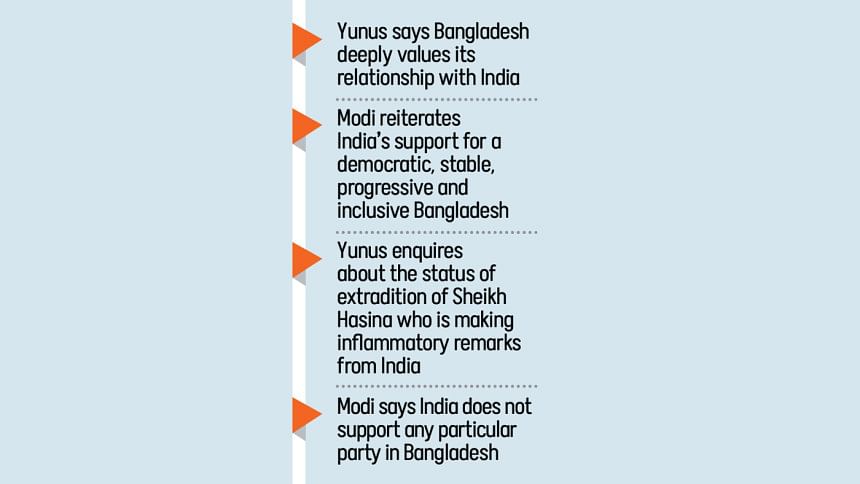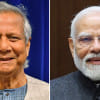Yunus-Modi talks in Bangkok: Dhaka, Delhi to take ties on the right track

In a thawing of relations, Chief Adviser Prof Muhammad Yunus and Indian Prime Minister Narendra Modi held a bilateral meeting yesterday, seeking to work together and set the relations on the right track.
"Bangladesh deeply values its relationship with India," Prof Yunus told PM Modi during the 40-minute meeting, according to a statement from the Chief Adviser's Press Wing.

At the much-awaited meeting on the sidelines of the BIMSTEC Summit at Shangri-La Hotel in Bangkok, both of them expressed their commitment to maintain a good relationship and spoke of concerns over political and security matters.
"The deep-rooted friendship between our two countries is founded on intertwined histories, geographical proximity, and cultural affinity. We remain thankful for the unwavering support of the government and people of India during our most challenging time in 1971," Prof Yunus was quoted as saying.
PM Modi reiterated India's support for a democratic, stable, peaceful, progressive and inclusive Bangladesh and expressed his desire to forge a positive and constructive relationship with Bangladesh based on pragmatism.
At the meeting, Prof Yunus presented a photo to PM Modi. The photo is of PM Modi presenting a gold medal to Prof Yunus at the 102nd Indian Science Congress on January 3, 2015.
This is the first in-person meeting between the two leaders since the political changeover in Bangladesh in early August last year when Sheikh Hasina, the then prime minister, fled to India amid a mass uprising.
Over the months, India repeatedly expressed concerns, alleging that religious minorities had been attacked in Bangladesh. The interim government described India's concerns as interference in internal affairs and misrepresentations of isolated incidents.
In December 2024, Dhaka requested New Delhi to extradite the former PM, who faces charges of mass killings. New Delhi has not responded to the request.
India reduced the number of visas issued to Bangladeshis, citing staff shortages at the high commission.
Against this backdrop, the bilateral meeting may serve as a confidence-building measure, even as concerns remain on both sides, foreign policy analysts say.
At the meeting, Prof Yunus said Hasina had been making inflammatory remarks and trying to destabilise Bangladesh, which seemed to be an "abuse of the hospitality" India extended to her.
Prof Yunus requested PM Modi to take appropriate measures to prevent Hasina from making incendiary statements while "she remains in your country".
He also mentioned Dhaka's extradition request.
Prof Yunus then referenced the UN Human Rights Office's Fact-Finding Report, which confirmed serious human rights violations and abuses committed by security forces and armed Awami League activists between July 15 and August 5, 2024.
He said the OHCHR report estimated that 1,400 protest-related deaths had occurred, with approximately 13 percent of the victims being children, and found reasonable grounds to believe that crimes against humanity had been committed during the protests.
PM Modi blamed social media for the tensions caused by Hasina's remarks.
"Prime Minister [Modi] urged that rhetoric that vitiates the environment is best avoided," read a statement issued by the Indian Ministry of External Affairs [MEA].
The statement issued by the CA's Press Wing quoted PM Modi as saying that India did not support any particular party in Bangladesh. "Our relationship is people-to-people."
Prof Yunus stressed working together to reduce the number of fatalities at the India-Bangladesh border.
PM Modi replied that Indian border troops opened fire only in self-defence and the fatalities occurred in Indian territories. The two leaders stressed the need to work together on this issue, according to a statement of the MEA.
"On the border, strict enforcement of the law and prevention of illegal border crossings, especially at night, are necessary for maintaining border security and stability. Bilateral mechanism could meet as appropriate to review and take forward our ties," it said.
According to the MEA statement, PM Modi said he expected the Bangladesh government to ensure the safety of Hindus and the people of other minority communities and called for thorough investigation into the cases of atrocities committed against them.
"PM also underlined the need to ensure the safety & security of Hindus in Bangladesh and tackle growing extremism which is a threat to regional stability," Randhir Jaiswal, official spokesperson of the MEA, wrote on X.
In response, Prof Yunus said he instituted an effective system for monitoring every incident of religious and gender violence in Bangladesh and was taking serious actions to stop any occurrence of such incidents, according to the CA's Press Wing.
He also said the reports of attacks on the minorities were inflated and "the bulk of them were fake news".
The CA asked the Indian leader to send reporters to Bangladesh to investigate the alleged attacks themselves.
He called for discussions to renew the Ganges Water Treaty and to sign the Teesta Water Sharing Agreement.
Stating that the history of the two neighbours is intricately linked, the Indian prime minister said New Delhi has always attached "highest priority" to its relationship with Dhaka, highlighting that cooperation between the two countries brought tangible benefits to the people of both countries.
PM Modi congratulated Prof Yunus on his assumption of the BIMSTEC chairmanship and looked forward to advancing regional cooperation.
He expressed his conviction that all issues of mutual interest between the two countries would continue to be addressed and resolved bilaterally.
Foreign Adviser Tauhid Hossain, CA's High Representative Khalilur Rahman, Indian External Affairs Minister S Jaishankar, and Indian National Security Adviser Ajit Doval were present at the meeting.

 For all latest news, follow The Daily Star's Google News channel.
For all latest news, follow The Daily Star's Google News channel. 









Comments